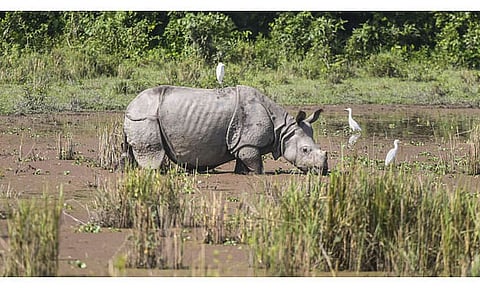
- Home
- Live Blog
- Breaking News
- Top Headlines
- Cities
- NE News
- Sentinel Media
- Sports
- Education
- Jobs

A Correspondent
NUMALIGARH: Ever since the outbreak of coronavirus, lack of human activity has led to flourishing wildlife across the world. The global air pollution has come down with fewer industries or factories on run, cars and people on roads; dense human populated areas are slowly being reclaimed by nature. Assam has also witnessed a number of incidents where wild animals were sighted in dense human populated areas. Even some rare wild species were reported roaming in places where they had no past history of being sighted.
Leopards, rarely seen black panthers, elephants, deer and other wild animals have visited dense human populated rural and semi-urban areas lately. This nature's comeback phenomenon is widely desired by all the nemophilists and wildlife conservationists across the State. A few days during lockdown are a great chance for nature. The ecosystem started flourishing with the lockdown announced by the Government of India. There is a drastic reduction in vehicular emissions; the industrial operations have come to a halt, with no human interactions to spoil nature, and a resultant improvement in the air quality. The air is much healthier than before. But it is only the bright side, enhancing bio-diversity for a limited period only or we may call it just a partial picture.
The Coronavirus outbreak may not bring all the good for world bio-diversity, wildlife and nature. Most of the world's biodiversity is found in the underdeveloped or developing, low-income countries and emerging economies. In such places the economic impacts of the pandemic are likely to be devastating for the natural world. The people of many low-income countries simply don't have much economic or livelihood support from their governments, leaving them incredibly vulnerable. For many, only forest and other natural resources will provide their safety net for living. Exploiting natural resources is often the only option for the destitute. Wild animals, fish and forest trees are rarely owned by anyone, and they are found in rural areas where policing is difficult. So, when people are left with nothing, they can always find something to eat or sell in the forest.
Moreover, the shutdown of tourism in all parks and sanctuaries has pulled the financial rug out from thousands of protected areas, leaving them without an operational budget for anti-poaching surveillance and other activities. It is pertinent that things are not out of hands yet, but if the situation doesn't come back to normalcy it will go that way.
There are reports on news portals that the wet markets of China are already open again. It has caused worries to the global wildlife conservationists for the illegal wildlife trafficking will also be in full swing after this. On the other hand, on April 24, 2020, National Board for Wild Life (NBWL), the apex body to review all wildlife-related matters, has permitted the use of 98.59 hectares of land at Saleki, a part of the Dehing Patkai Elephant Reserve in Assam for opencast coal mining project done by North Eastern Coal Field (NECF), a unit of Coal India Limited. The rest of the area was permitted to be used for underground coal mining. Wildlife conservation organizations and conservationists of the State have boldly opposed this action stood against NBWL's permission for coal mining inside the Dehing Patkai Elephant Reserve, which is a part of the Dehing Patkai Wildlife Sanctuary.
This move also signifies how government and its bodies can nod for projects, mining in the coming days which may lead to vast exploitation of natural resources. These moves may come as remedial measures to coup with the economic slowdowns of developing countries with rich bio-diversities. So, it can be said that the COVID-19 has bright and dark both the sides for wildlife and nature. It is just a matter of time when we will figure out the other side of post-pandemic period.